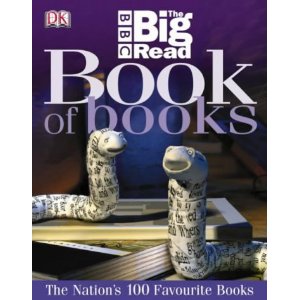You have no items in your cart. Want to get some nice things?
Go shoppingDespite very rarely winning anything, I am a competitive person. Although my days of playing team sports at school are now a distant memory, rather than mellowing with age, my competitive side has only got worse and I’ve found myself focussing all my competing instincts on academic pursuits. I’ll admit it: I like to be on the winning team in debates, get the best marks in essays and even come top of the class in the end of term Christmas quiz. So when I saw a Facebook ‘app’ challenging me to see how many books I had read from the BBC’s ‘Big Read Top 100’ list and test my self-imposed label as a bookworm, I was intrigued. I had to give it a go.
I got mixed results – although I had beaten the average of 6, I had only read 39 out of 100 ‘must-reads’, trounced by some of my classmates who had posted their own totals to compare with mine. Rather than reaffirming my love of literature, the list left me feeling a little inadequate. And at the risk of sounding like a sore loser, I couldn’t help but disagree with some of the books that had made the Top 100. Meg Cabot’s ‘The Princess Diaries’ made the grade but E.M. Forster didn’t? Of course, it’s only my personal opinion but I was baffled by some of the choices in the top 100, as well as a little confused by the point of the actual list itself. Should we rate our favourite books and, if we should, how do you go about ranking them?
Literature has been ranked and listed for decades. Anyone who has studied English at secondary school will be aware of the existence of a literary canon, the great books that have shaped the way we read and write today and made their indelible mark on our culture. In the first half of the twentieth century, the Formalist critics were very keen to evaluate the worth of texts and rank them in order of greatness. Although slight changes have been made over time, the literary canon still stands strong and dictates a lot of what we read, watch and learn today. It probably always will, although some campaign for its abandonment.
The ‘Big Read’ list, on the other hand, is ranked by popularity. Launched in 2003, the goal was always to find the nation’s best-loved book. Whereas the canon was chosen by intellectuals steeped in high culture, the BBC threw their ‘Big Read’ list open to the public, asking people to vote for their favourite book through SMS texting and the Web. You can see the results here. The public vote certainly does make this list more democratic than others but popularity doesn’t necessarily mean quality writing. The Guardian have gone one step further and created a ‘100 Best Books of All Time’ list, crowning Hans Christian Andersen’s ‘Complete Fairy Tales and Stories’ the ultimate worthwhile read. Worse still, are the lists that claim you should read certain books BEFORE YOU DIE. Lists like these seem almost more akin to the Ten Commandments than a useful directory of friendly recommendations. Surely, reading ought to be a pleasurable pastime but by adding the concept of our own mortality, these lists create an uneasy pressure to complete all the books or face an afterlife of regret and bitter failure. The MLA’s ‘List of 30 Books Every Adult Must Read Before They Die’ is at least do-able, but the 1001 books variety is just plain depressing for the completist.
It brings me back to questioning what the point is of all these lists? Are they useful? Some would argue that lists like these direct you to new books and help you sift the wheat from the chaff. They give new readers, unsure of where to begin, a starting point. Even the ‘Read Before You Die’ lists give people a challenge or a goal to focus on. I can certainly understand why people would turn to these lists for direction but to me, all these lists do is create feelings of inadequacy. After looking at them, I feel ashamed that I haven’t read more than half of the books from the Top 100 and even guilty for picking up the latest Charlaine Harris book for my holiday reading, instead one of the chosen few. Many of us aren’t in school any more, no-one ought to tell us what we can and can’t read. How can you truly enjoy a book if you are forcing yourself to read it? For me, ‘lists of bests’ can be fun, some can even be useful but I would advise against following them to the letter: sometimes, it’s best just to leave the lists and keep an open mind.
Briony Wickes





